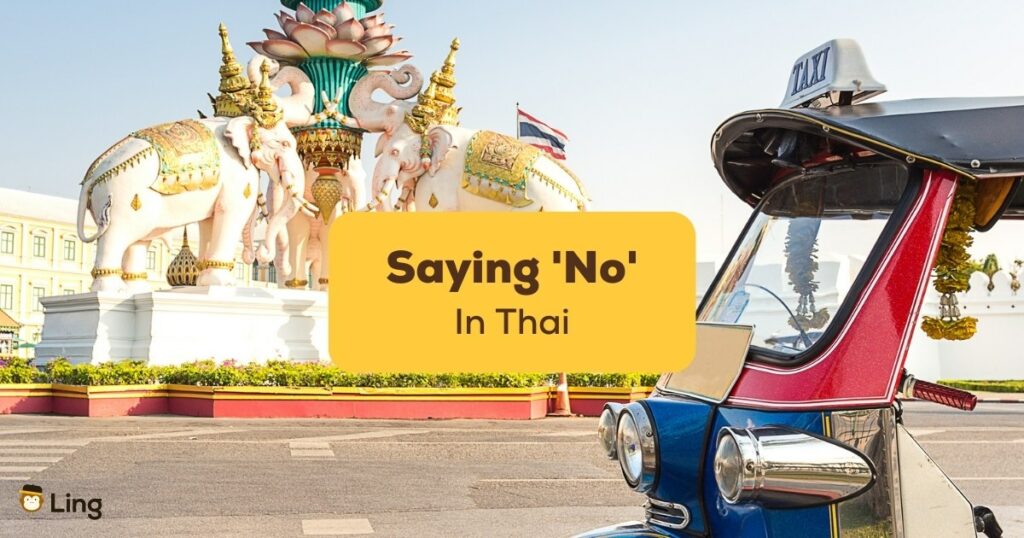It sounds funny, but it’s pretty difficult to learn how to properly say no in Thai because Thais find it terribly hard to say “no.” This may be a side effect of the culture of avoiding confrontation, so most Thais try to find ways to say “no” without actually saying it. Therefore it is important to learn it the proper way.
How To Say No In Thai?
Say “No” Like A Real Thai
When someone asks you a question in Thai that ends with the yes or no question word ไหม (mái), the answer is not as straightforward as it would be in English. You must repeat the verb or adjective that was used in the question in order to respond “yes” along with the verb or adjective that was used in the question to answer “no” or “not” – ไหม (máy).
It may sound strange at first, but this is a perfectly normal exchange in Thai:
- ร้อนไหม (rɔ́ɔn máy) = Is it hot? / Are you hot?
While ไม่ (mây) can be used to respond “no” to a question without the verb or adjective, it is generally preferable to include the verb or adjective from the question. If ไม่ (mây) is used without a verb or an adjective, it can be preceded by ไม่นะ (mây na). นะ (na) is a Thai particle that changes the sound of the word or sentence to become softer.
Example:
- เหนื่อยไหม (nʉ̀ay mǎy) – Are you tired?
- ไม่เหนื่อย – (mây nʉ̀ay) – I’m not tired
- ไม่เหนื่อยนะ – (mây nʉ̀ay na) – I’m not tired (softer/informal)

The Term For ‘No’ In Thai
-
ไม่เอา (mây aw) – (I) Don’t Want (Something)
Literally translated, it means something like “not take” or “not want.” ไม่เอา (mây aw) is a useful term to know while visiting Thailand. There will always be hawkers trying to sell you anything from souvenirs to massages if you are walking through a touristy area, so it’s practical to know how to decline.
To say “no thank you” in these kinds of situations, you can just say:
เอา (aw) is also used when asking if somebody wants something. The structure is:
For example:
- เอาน้ำไหมคะ (aw nám máy khá) – Would you like some water? (female speaker)
- ไม่เอาครับ (mâi aw khráp) – Literally: not want (male speaker)
if you want to say “yes” to the question, you use the verb that was asked in the question. So in this case, the way you say yes is:
Don’t Forget To Say ‘Thank You’
No matter the situation, Thais are always polite, so remember to say thank you
- ขอบคุณครับ (khɔ̀ɔpkhun khráp) for a male speaker or
- ขอบคุณค่ะ (khɔ̀ɔpkhun khà) for a female speaker

How To Say “Not” In Thai
We can use the same structure from ไม่เอา (mâi ao) to form other sentences too. The structure is just:
- ไม่ (mây) + verb or adjective
Most common phrases with ไม่ (mâi):
ไม่มี (mây mii) – I don’t have it
Customer (female speaker):
- มีโค้กซีโร่ไหมคะ (mii coke zero mǎy khá) – Do you have Coke Zero?
Shopkeeper (male speaker):
- ไม่มีครับ (mây mii khráp) – Literally: not have
You can use this when you are shopping or in a restaurant in Thailand. Just add the item that you want after the word มี (mee):
ไม่ชอบ (mây chɔ̂ɔp) – I don’t like it
- ชอบทุเรียนไหม (chɔ̂ɔp thúrian mǎy) – Do you like Durian?
- ไม่ชอบ มันเหม็น (mây chɔ̂ɔp man měn) – I don’t like, it smells
ไม่เผ็ด (mây phèt) – not spicy
ไม่สวย (mây sǔay) – Not beautiful
ไม่อร่อย (mây arɔ̀y) – Not delicious
Other common ไม่ (mây) + verb or adjectives
- ไม่กิน (mây kin) – I’m not going to eat
- ไม่ไป (mây pay) – I’m not going
- ไม่ร้อน (mây rɔ́ɔn) – It’s not hot.
- ไม่หิว (mây hǐw) – I’m not hungry
- ไม่พูด (mây phûut) – I’m not talking
ไม่ใช่ (mây chây) – No
Some Thai questions end with ใช่ไหม (chây máy). This is similar to how we transform a sentence into a query in English by adding “right?” or “isn’t it?” at the end. This question is usually asked when someone wants to clarify something. You have the option of responding to these questions.
For example:
- เป็นคนอเมริกัน ใช่ไหม (pben kon amerikan châi – You’re American right?
เปล่า (plàw) – No
While เปล่า(plàw) means “no,” it is not widely used in Thai as a response to a question. It is more widely used in conjunction with หรือ (rʉ̌ʉ) “or” to make หรือเปล่า (rʉ̌ʉplàw), which is then used at the end of a sentence to form a “or not” query.
For example:
- จะมาหรือเปล่า (cà maa rʉ̌ʉplàaw) – Are (you) going to come or not?
If we want to say “no” to this question, we can just use the same structure that we learned above:
ไม่ + verb or adjective.
So the best way say “no” to this question is:
-
- ไม่มา (mây maa) – I’m not coming (Literally: “not come”)
- ไม่มา (mây maa) – I’m not coming (Literally: “not come”)

Don’t Just Say No!
Now you know how to say no in Thai! It feels so amazing to be able to understand a different language, especially when you are traveling Thailand and you can understand the locals; this will give you a big advantage. When you visit a shop, your favorite restaurant, or even your Thai neighbor co, you get treated differently when you know some words.
The best way to improve your Thai language skills is certainly with the Ling Thai app. Give it a try, maybe even today! The many tests, games, and challenges may just be your ticket to improving your Thai ability.
Download Ling from Google Play or App Store and start your journey today!
Updated by: Gwyn





